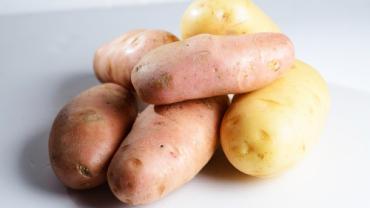
White potatoes are a beloved American side entrée and highly touted “vegetable” with the strange ability to provoke hostile reactions when elimination is suggested. We can remove the soda, the candy bars, the fast food, and even the pasta, but… not the potatoes! Perhaps, it is the comfort food status, or the fact that potatoes offer the choice of an inexpensive filler. Regardless, these addictive tubers beg for an adequate explanation of their inferior role in health-promoting lifestyles.
The nutritional offerings of the white potato have often been viewed as less than stellar, in favor of their close companion – the sweet potato. In fact, the sweet potato has obtained the prestigious status of “superfood” because of its rich nutrient profile, while the white potato remains debated, and marginalized, at best. Both potatoes are members of the tuber family and boast a starchy interior, but the sweet potato has more fiber, fewer carbohydrates, fewer calories, and more vitamins, compared to the white potato. Of greater interest to Paleo fans and health advocates is the sweet potato’s more favorable impact on blood sugar, which won’t leave the consumer riding an exhausting blood sugar rollercoaster.
Fiber, Starch, and Blood Sugar
The debate with potatoes is usually centered around their ability to influence blood sugar. The flesh of potatoes is a storehouse of starch. During digestion, this starch is quickly disassembled into individual glucose molecules that are absorbed into the blood stream. The pancreas then responds to the flood of glucose, by secreting the hormone insulin, which will direct the sugar out of the blood and into cells.
The speed at which this process takes place is important for health. Too much glucose, too quickly, may trigger a rush of insulin and begin an oscillation between high and low blood sugar. Fiber can quickly remedy this situation. By binding to glucose in the gut, it can balance the rate at which glucose is absorbed. Compared to white potatoes, sweet potatoes have more fiber and less starch and, therefore, may better support a healthy blood sugar level. However, sweet potatoes are certainly sweeter than white potatoes and do, indeed, contain more natural sugar, evidenced not only by its sweeter flavor but also by its ability to caramelize. So how is this situation remedied?
It turns out that cooking methods and accompanying foods can highly impact the ability of both sweet and white potatoes to raise blood sugar. When the starch of potatoes is boiled (versus baked) it gelatinizes, which results in a more balanced release of glucose. Similarly, when the starch of potatoes is cooked and then cooled, the cooling effect will cause some of the sugar to revert back to a fiber-like starch, called resistant starch. This type of starch is difficult to digest, resulting in a better blood sugar response. Therefore, a cold potato salad may have a better impact on blood sugar compared to a steamy bowl of mashed potatoes. Consuming healthy fats and proteins with starch will also support more balanced blood sugar. Fats and protein slows digestion. Therefore, it is always a good idea to smoother potatoes in a healthy fat such as coconut oil, top with a sprinkle of ground flaxseed, and enjoy with a grass fed roast or free-range roasted chicken.
Vitamins and Minerals
While we may not be able to criticize the white potato based on blood sugar alone, we can certainly see its inferiority on the nutrient scale. Sweet potatoes have a phenomenal amount of vitamin A, delivering over 400 percent of the RDA in every medium sized potato, primarily in the form of beta-carotene. Beta-carotene is a powerful nutrient that supports skin and eye health, cell growth, brain function, and helps to improve blood sugar. Sweet potatoes are also superior to white potatoes by possessing more vitamin C, thiamin, riboflavin, vitamin B6, pantothenic acid, calcium, and manganese. To give white potatoes a fair review, they excel in providing folate, potassium, and (drum roll, please), a better ratio of healthy omega 3:6 fatty acids.
Antioxidants
Antioxidants are often the plant nutrients that distinguish “superfoods” from their not-so-super counterparts. Antioxidants are known to be the colorful agents found in richly colored foods, thereby indicating that the bright orange flesh of the sweet potato just may possess more health-promoting antioxidants compared to the rather colorless flesh of the white potato. As assumed, sweet potatoes are renowned for their rich content of antioxidants that are able to neutralize the damaging free radicals that threaten our health. Water and air contaminants, food chemicals, cleaning products, and electromagnetic pollution continue to endanger our health by increasing free radicals in the body. Therefore, antioxidants are more important today than at any other time in history. Choosing sweet potatoes, with a high antioxidant advantage, is one way to ensure optimal antioxidant levels and good health.
If you want to make every food item count, sweet potatoes offer many advantages over white potatoes. A quick review of the amazing, health-promoting vitamins, minerals, and antioxidants supplied by the sweet potato should give consumers reason to pause and consider making the switch. Additionally, choosing to cook and consume potatoes in ways that decrease their impact on blood sugar will ensure an even healthier meal.
Sources
Bahado-Singh, PS, Riley, CK, Wheatley, AO, & Lowe, HIC. (2011). Relationship between processing method and the glycemic indices of ten sweet potato (ipomoea batatas) cultivars commonly consumed in jamaica, Journal of Nutrition and Metabolism, vol. 2011, Article ID 584832. http://dx.doi.org/10.1155/2011/584832
King, JC., & Slavin, JL. (2013). White potatoes, human health, and dietary guidance, Advances in Nutrition, 4: 393S-401S, doi: 10.3945/an.112.003525
Higuchi et al. (2015). Associations of serum β-carotene and retinol concentrations with insulin resistance: the Toon Health Study. Nutrition, 31(7-8):975-80. doi: 10.1016/j.nut.2015.02.015.
Ji, H. , Zhang, H. , Li, H. and Li, Y. (2015) Analysis on the Nutrition Composition and Antioxidant Activity of Different Types of Sweet Potato Cultivars. Food and Nutrition Sciences, 6, 161-167. doi: 10.4236/fns.2015.61017.